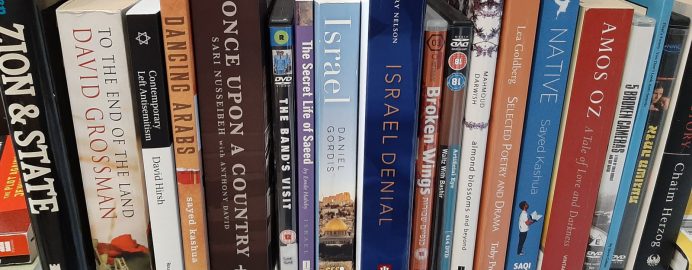Each week Fathom writers have been recommending Israel-related books, films or podcasts to help our readers through the lockdown. This week, it’s the turn of BICOM and We Believe staffers Richard Pater, Sam Nurding, Luke Akehurst, and Calev Ben-Dor. Read previous recommendations here, here, here, here and here by following the links provided.
Luke Akehurst recommends Amos Oz’s A Tale of Love and Darkness
My lockdown book recommendation is Amos Oz’s classic memoir of his early years and family history, A Tale of Love and Darkness, published in 2002.
I thought I knew a lot about Israel, based on my work at BICOM and my visits there, before I read this book.
But an acquaintance who is an Israeli living and working in London lent me their copy, expressed surprise that I hadn’t read it, and said ‘until you read this you will not really have understood the Israeli psyche.’
Reading this book will mean you get some insight as an outsider into life in pre-Shoah Jewish Eastern Europe; the trauma of Israel’s birth; the dying years of the Mandate; the shadow of the Holocaust and the individual decisions and quirks of fate that led some European Jews to a new life in a new state, and millions more to death at the hands of the Nazis; the chaos and bloodshed and austerity of the War of Independence; the intense political divisions, even within families, between different strands of Zionists; and the raw idealism of the new nation. Israel is a small country so Oz bumps into many key figures in the Zionist movement as he grows up.
But it’s not just a book that shows you the history of the early years of Israel through the eyes of a child, it’s an examination of the internal dynamics of a family going through incredible trauma, the impact on their emotional wellbeing, and eventually the suicide of Oz’s mother, which he hadn’t discussed publicly or even with his father before writing the book.
It is a beautiful book. The quality of the writing is superb and given I have only read it in the English translation, the translator from Hebrew deserves a prize as well.
Read it to understand what made Amos Oz. Read it to understand the uniqueness of the Israeli and Jewish experience if you are not Israeli or not Jewish. And read it to understand what it is to be a human being.
There are pages and phrases that will sear themselves into your memory.
There are passages that will make you laugh, and many more that will make you cry.
This is literature at the highest level.
I can’t recommend it highly enough.
Luke Akehurst is Director of We Believe in Israel.
*
Calev Ben-Dor recommends Ben Caspit’s The Netanyahu Years and David Biale’s Power and Powerlessness in Jewish History
With news of an agreement between Benjamin Netanyahu and Benny Gantz to form a so-called national unity government, it is worth revisiting Ben Caspit’s biography The Netanyahu Years. While Anshel Pfeffer’s biography of Netanyahu is rightly lauded, Caspit’s seems to have been overlooked by an English speaking audience. When I sat down with Caspit to discuss his book for Fathom, he joked that some of American reviews concluded that it was obvious he admired Netanyahu (primarily because he doesn’t place the entirety of the blame for the Obama-Netanyahu spats on the Prime Minister). One thing that continues to stay in my mind from that conversation is Caspit’s argument that, despite those predicting the end of Netanyahu’s career, as long as his political future remains in his own hands he can never be ruled out. It may be that Netanyahu’s (much delayed) court cases will ultimately bring the Prime Minister down. But fresh from the new coalition agreement which all but guarantees an additional 18 months at the helm, Netanyahu may feel more confident of his future than he has for a while. That period certainly provides more than enough time for readers to get through Caspit’s page-turner of a book.
The second book worth revisiting is David Biale’s Power and Powerlessness in Jewish History. For early Zionist thinkers, one of the core issues surrounding the Jewish question was the perceived ‘powerlessness’ of Jews living as minorities in the countries in which they lived – a feeling that inspired Chaim Nachman Bialik’s description of the wretched, passive ‘sons of the Maccabees’ in his City of Slaughter.
In fact, the dichotomy between ‘sovereignty equals strength (which equals survival)’ versus ‘diaspora equals weakness (which equals being murdered)’ was never as clear cut as many alleged. Biale’s book, published almost 35 years ago, sets to break this dichotomy, arguing that diaspora Jews had not been quite as politically passive over the centuries as assumed and that early ‘sovereign’ Jewish Kingdoms of old weren’t quite as independent – Biale calls them ‘disunited and externally dominated’ for most of their existence’ – as nostalgically described. He also raises the question of how Israel can work through the dialectic between the objective military power the states possesses, and the psychological insecurity many of its citizens (and leaders) feel; ‘If Jewish sovereignty is to endure, Jews must find a way of navigating a middle course between dreams of boundless power and nightmares of historical powerlessness.’ As we enter the period between Holocaust Memorial Day and Independence Day, these issues remain as relevant as ever.
Calev Ben-Dor is deputy editor of Fathom.
*
Samuel Nurding recommends Asher Susser’s Israel, Jordan, and Palestine The Two-State Imperative
Perhaps I am stealing a recommendation made to me by a colleague when I first joined BICOM, but Asher Susser’s Israel, Jordan, and Palestine The Two-State Imperative (2011) is one of the most enlightening books I have ever read. It explains in clear and urgent prose why a two-state solution has failed to materialise. Over the last eight years of Fathom Journal’s existence, Susser has become one of its ‘must read’ contributors; he is Israel’s leading expert on Jordan and the Palestinians and was the only Israeli academic in 1994 to accompany then-prime minister Yitzhak Rabin to his meeting with King Hussein of Jordan for the signing of the Washington Declaration before the US Congress.
Israel, Jordan, and Palestine The Two-State Imperative explores what has been lacking in negotiations to resolve the conflict: 1948 and refugees, or in other words, questions related to narratives and collective identity. If you do not believe me, just read what veteran Palestinian negotiator Hussein Agha told Fathom in 2018: ‘In all the negotiations I was involved in, I argued that Israelis had their narratives and Palestinians had their narratives and we shouldn’t waste time disputing them … I now think that approach does not work. You keep being pulled back into the original issues and so into narratives, identities, feelings, psychologies.’
Samuel Nurding is Deputy Editor of Fathom Journal and Research Associate at BICOM.
*
Richard Pater recommends Ronen Bergman’s Rise and Kill First
There are so many books of a similar genre, looking at Israel’s engagement with her enemies, but Ronen Bergman’s Rise and Kill First, the secret history of Israel’s targeted assassinations, may be the best.
Based on thousands of interviews and a mass of documentation it is the most comprehensive, compelling and, yes, even balanced account. Bergman excels as a storyteller, he is also one of Israel’s leading investigative journalists and security experts, he writes for Israel’s leading newspaper Yediot Ahronot as well as the New York Times.
In parts, the book reads like a Hollywood blockbuster as he recounts the operational history of the Israeli security forces including elite IDF commando units, the Shin Bet internal security service and of course the Mossad. The reader is taken from the pre-state militia’s and Nazi hunters to the efforts to prevent the various malicious plans of Iraq, Syria and now Iran.
As a precursor to the advanced cutting edge technology of today, Israel first deployed a surveillance drone in 1992, as part of the operation to kill Hezbollah leader Abbas al-Musawi, the predecessor to Hassan Nasrallah. This and countless other attacks are the subject of debates by the practitioners themselves over the virtues, morals and strategic advantages of such strikes, and Bergman introduces us to them all.
Similarly, Israel’s 50+ year campaign against Palestinian terrorism does not escape serious introspection and criticism. However, at times, Bergman’s tone gives implicit sanction when the strike was deserved, but does not hold back when it was counterproductive or led to the killing of innocents. He manages to weave into his storytelling a sophisticated analysis of the political context of the dilemmas faced by decision makers as well as revealing incredible operational details from planning to execution.
In one particularly powerful chapter, he describes how Arafat left Beirut port in 1982 within range of several Israeli snipers, who had him in their sites, but Defence Minister Sharon had committed to Prime Minister Begin he would not be targeted. Bergman then reveals that while Begin fell into depression and incapacitation, an incandescent Sharon spent the next few months plotting to kill Arafat as he travelled across Europe. On one such trip, they hear that the pilots carry US passports – a young intelligence officer Amos Gilad warns ‘nobody touches Americans.’ This episode is also testament to the IDF planners who understand it is inconceivable to target a commercial airline, even with Arafat onboard and present a range of operational difficulties so that the order cannot be carried out.
Through my work with BICOM, I have met numerous characters that appear in the book, though mostly having retired or entered politics, the majority, by the way, on the centre-left of Israeli politics.
Richard Pater is the Director of BICOM.
*



































Comments are closed.